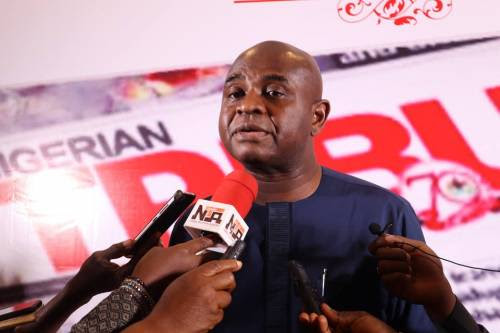NEWS
Stop borrowing irresponsibly! – Moghalu warns Buhari

In response to President Buhari’s new move to borrow fresh ₦12tn as public debt hits ₦50tn by 2023, a former Deputy Governor of the Central Bank of Nigeria and former presidential candidate, Kingsley Moghalu, condemned the constant borrowing of the Federal Government, saying it was irresponsible, Top Naija reports.
He said, “I condemn the borrowing plan in its entirety. I think the Federal Government of Nigeria has been borrowing irresponsibly and mortgaging the future of the youth of Nigeria.
“This should stop. The damage will be very difficult to repair. There is no need for Nigeria to be borrowing at the rate it is borrowing and the huge sums it is borrowing.
“There is an element of callousness in this. They are doing everything as possible to borrow before 2023, and then walk away and hand over the problem to someone else.”
The Executive Director of Centre for Anti-Corruption Open Leadership, Mr Debo Adeniran, said that the government is becoming reckless in borrowing at a fast pace.
He said, “The government is fast becoming reckless in the way it is borrowing, yes, it might have its reasons to have resorted to borrowing because of the infrastructural deficit and collapse which was in existence before this administration came in. but this administration needed to understand that it could not solve all the problems of more than 50 years overnight.”
He added that taking interest-yielding loans will likely enslave the citizens and future generations.
“And taking interest-yielding loans is likely to enslave us and the generations to come. Most of the countries that are giving us loans are entrapping us like China. All the infrastructures we are using their loans to build are very sensitive and if they are to take over it Nigerians will suffer,” he added.
He advised the government to recover looted funds, which would be useful in funding infrastructure projects.
“What I believe that the government could have done is to recover looted funds and what the looters procured with the proceeds of their crime, that will go a long way in covering some of the infrastructural gaps that we are bridging with the loans,” he said.
“Instead of always thinking of borrowing, the government can go after those that owe the country, For instance, NEITI recently detected some money that is being held by some wealthy individuals, money that runs into trillions but the government isn’t going after those funds.”
He added that the government’s borrowing pace was not sustainable as revenue generated would be used to service debts.
“Also, our borrowing pace is not sustainable, because almost all the revenue generated by the country is used to pay the current debt and that is why the government doesn’t have enough to pay for a lot of its expenditure,” he added.
An economist and the Chief Executive Officer of the Centre for the Promotion of Private Enterprise, Dr Muda Yusuf, said that the increasing debt profile of the government raised some sustainability concerns.
Yusuf, who is a former Director-General of the Lagos Chamber of Commerce and Industry, said, “The rising debt profile of the government raises serious sustainability concerns. Although the government tends to argue that the condition is not a debt problem, but a revenue challenge. But the truth is that debt becomes a problem if the revenue base is not strong enough to service the debt sustainably. It invariably becomes a debt problem.”
He also stressed the need to cut down expenditures and implement reforms that could reduce the costs of governance and ease the fiscal burden.
“What is needed is the political will to cut expenditure and undertake reforms that could scale down the size of government, reduce governance cost, and ease the fiscal burden on the government.
“It is imperative for the country to operate as a true federation which it claims to be. The unitary character of the country is making it difficult to unlock the economic potentials of the sub-nationals. It is perpetuating the culture of dependence on the federal government.
“It is necessary to scale down the size of government and cost of governance. Fiscal sustainability is driven by both cost and revenue. Therefore managing the major drivers of cost and revenue is imperative. As far as possible, the government should push back in sectors or activity areas where the private sector has the capacity to deliver desired outcomes. We should see more concessions and privatisations at all levels of government,” he said.